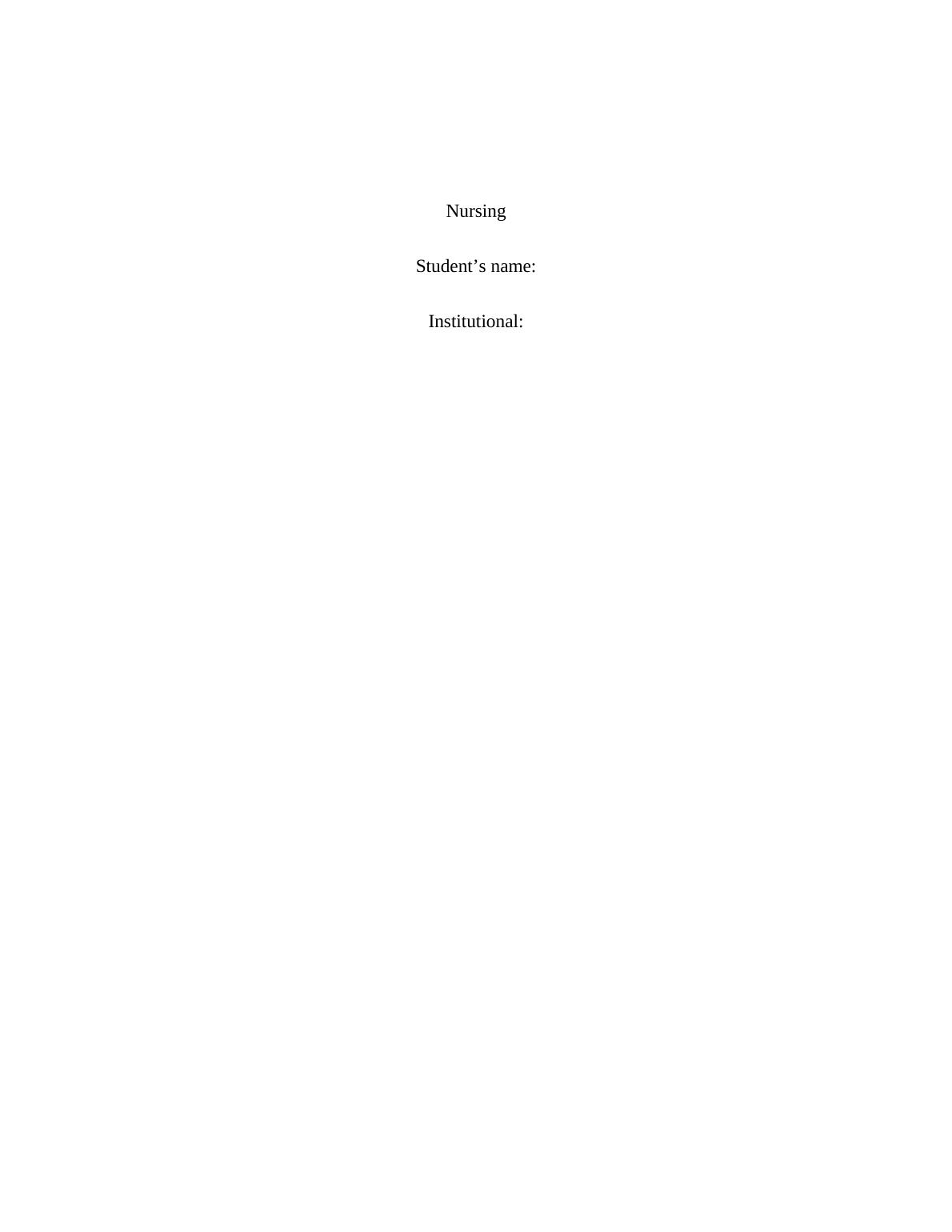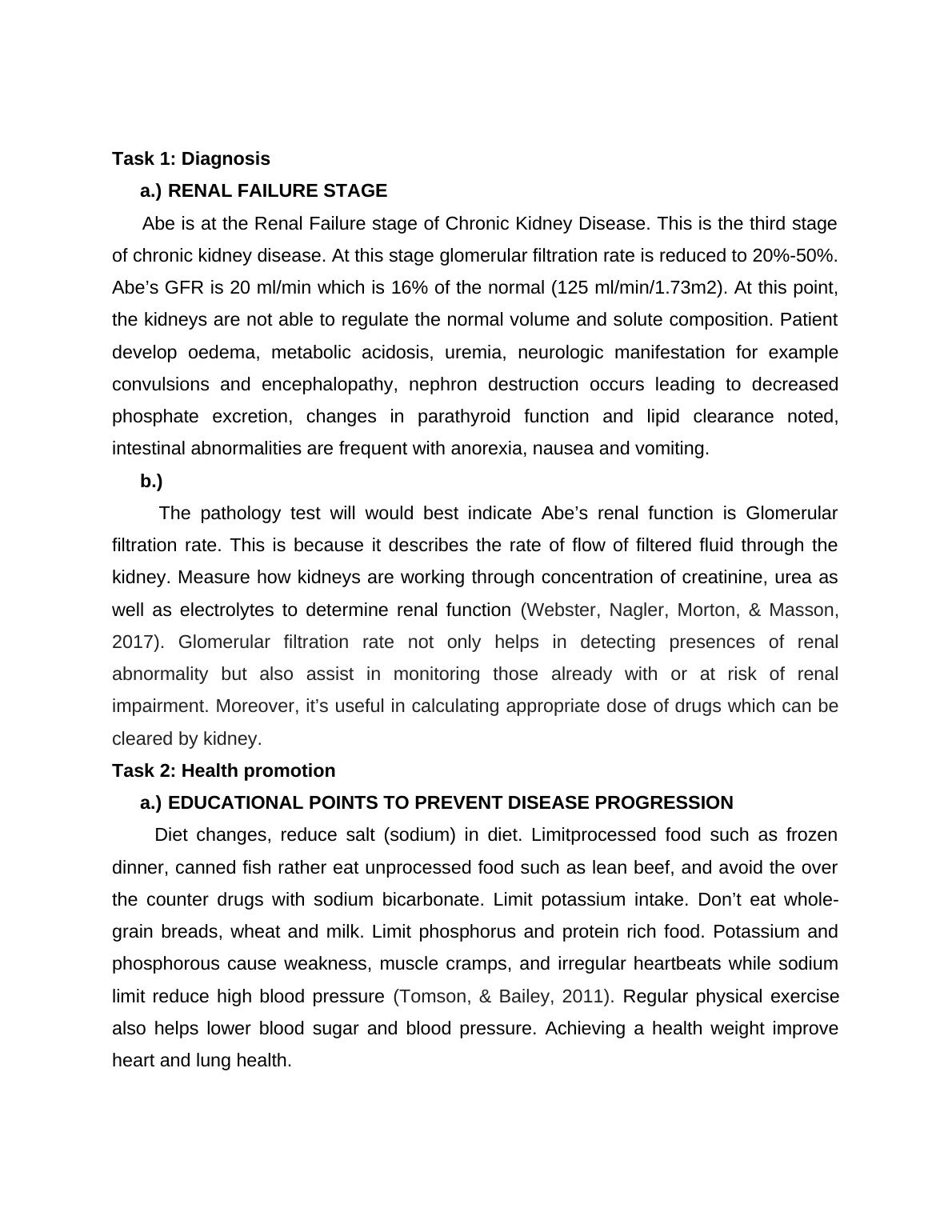Diagnosis Renal Failure Stage
Added on 2021-04-24
7 Pages1948 Words37 Views
NursingStudent’s name:Institutional:

Task 1: Diagnosis a.)RENAL FAILURE STAGE Abe is at the Renal Failure stage of Chronic Kidney Disease. This is the third stageof chronic kidney disease. At this stage glomerular filtration rate is reduced to 20%-50%.Abe’s GFR is 20 ml/min which is 16% of the normal (125 ml/min/1.73m2). At this point,the kidneys are not able to regulate the normal volume and solute composition. Patientdevelop oedema, metabolic acidosis, uremia, neurologic manifestation for exampleconvulsions and encephalopathy, nephron destruction occurs leading to decreasedphosphate excretion, changes in parathyroid function and lipid clearance noted,intestinal abnormalities are frequent with anorexia, nausea and vomiting.b.) The pathology test will would best indicate Abe’s renal function is Glomerularfiltration rate. This is because it describes the rate of flow of filtered fluid through thekidney. Measure how kidneys are working through concentration of creatinine, urea aswell as electrolytes to determine renal function (Webster, Nagler, Morton, & Masson,2017). Glomerular filtration rate not only helps in detecting presences of renalabnormality but also assist in monitoring those already with or at risk of renalimpairment. Moreover, it’s useful in calculating appropriate dose of drugs which can becleared by kidney.Task 2: Health promotiona.)EDUCATIONAL POINTS TO PREVENT DISEASE PROGRESSION Diet changes, reduce salt (sodium) in diet. Limitprocessed food such as frozendinner, canned fish rather eat unprocessed food such as lean beef, and avoid the overthe counter drugs with sodium bicarbonate. Limit potassium intake. Don’t eat whole-grain breads, wheat and milk. Limit phosphorus and protein rich food. Potassium andphosphorous cause weakness, muscle cramps, and irregular heartbeats while sodiumlimit reduce high blood pressure (Tomson, & Bailey, 2011). Regular physical exercisealso helps lower blood sugar and blood pressure. Achieving a health weight improveheart and lung health.

Good blood pressure control and changes in lifestyle can help manage high bloodpressure, for example, quitting smoking, regular body exercise, cutting down on alcoholand appropriate use medications also to control blood pressure. Smoking cause poorlyand uncontrolled blood pressure and also affects medicines used to treat high bloodpressure. Moreover, smoking slows blood flow to organs like kidney (Go, Chertow, Fan,McCulloch & Hsu, 2014).Help reduce stress. It may take time to adjust to the disease and patient to keepinvolved in pleasures, activities and responsibilities of daily life. Share your feelings withfamily, relatives and close friends or joining support group (Go et al ,2014).Taking medications as prescribed. Taking medication as prescribe by medicalpractitioner and avoid over the counter drugs such as anti-inflammatory drugs becausethey can damage the kidney.Diabetes control through conservative management, for example, exercise, taking drugsas prescribed, regular check-ups and managing stress. Ensure also that there earlymanagement of complications of diabetes especially nephropathy (Tomson, & Bailey,2011).b.)HEALTH IMPROVEMENT INTERVENTIONS1.Diet modificationEarly protein restriction (daily intake to be 0.6kg), potassium restriction (Burton, &Harris, 2011). Salt and water restriction, daily water intake be 500mls plus output thisslows progression of disease.2. Management of complicationsi) Anemia, treatment with hematocrit. Rule out iron and vitamin B12 deficiency.Administer recombinant erythropoietin since stimulate red blood cell production(Locatelli et.al 2011).ii) HypertensionUse of loop diuretics like furosemide and metformin and angiotensin converting enzymeinhibitor such as Ramipril to reduce blood pressure (Reddi, 2016) and restrict sodiumintake.iii) HyperkalemiaDietary restriction of food potassium containing food (Kidney Health Australia, 2012).

End of preview
Want to access all the pages? Upload your documents or become a member.
Related Documents
Chronic Kidney Disease | Case Studylg...
|8
|1731
|72
Reason for the Occurrence of Chronic Kidney Diseaselg...
|9
|1745
|13
Pathophysiology of Obesity and Diabetic Kidney Diseaselg...
|3
|1605
|40
Chronic Kidney Disease: A Case Studylg...
|12
|3166
|494
Chronic Kidney Disease: Case Study and Discussionlg...
|5
|1570
|166
Nursing Reflective Activity | Reportlg...
|5
|889
|54
